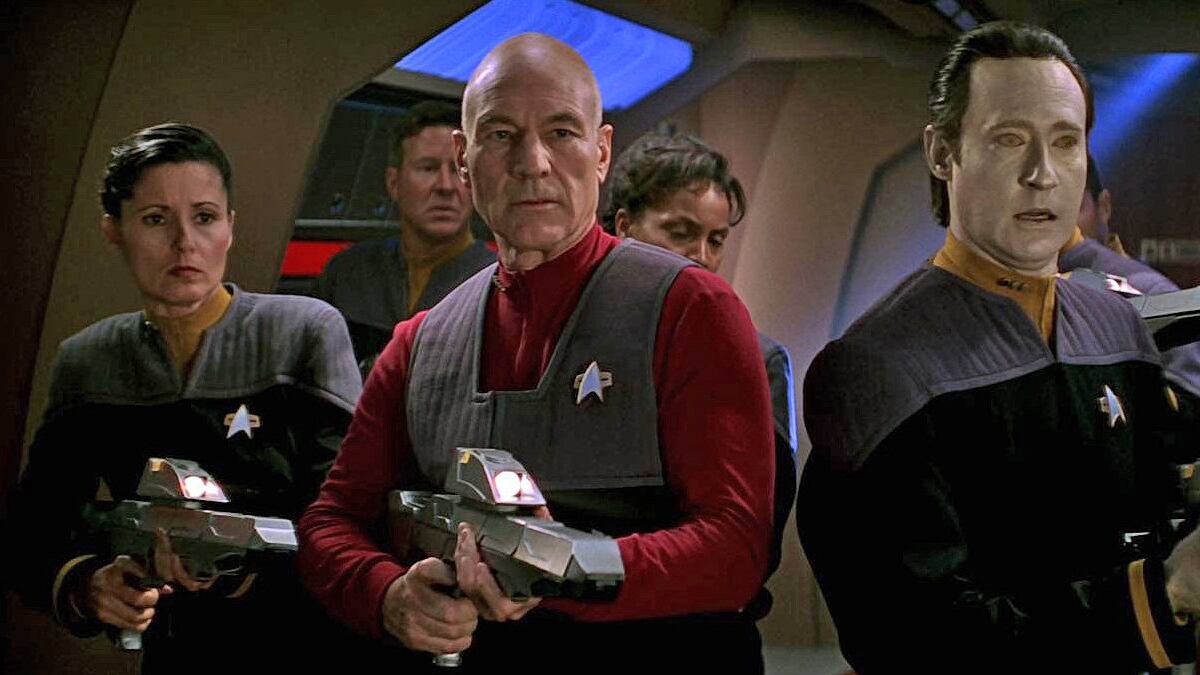Near the end of Star Trek: First Contact, Dr. Zefram Cochrane (James Cromwell) beholds Earth from space for the first time. “Oh, wow,” he murmurs.
Geordi La Forge (LeVar Burton), on the other hand, has seen it all before. “You ain’t seen nothing yet,” he says with a knowing smile.
In that line is a promise made not only by the film, but by Star Trek itself: When the world is drowning in hopelessness, wonderment is never beyond reach, even if you’re battling an army of monstrous cyborgs who insist, “Resistance is futile!”
Released in 1996, First Contact—which screens next Wednesday at the Hollywood Theatre—is one of the most brutal incarnations of Gene Roddenberry’s original TV show. It is also the most optimistic of all the Star Trek films because it shows how the bright future that Roddenberry’s creation depicts was forged.
Set in the 24th century, First Contact pits Captain Jean-Luc Picard (Patrick Stewart) and the crew of the Enterprise-E against the Borg, a race of cybernetic creatures hellbent on stripping humanity of any trace of individuality or independent thought.
When they first appeared in a 1989 episode of Star Trek: The Next Generation, the Borg wanted to absorb as many species as possible into their own. In First Contact, they have a more sadistic ambition: to travel back to the 21st century and stop humanity’s first encounter with alien life, which ended an era of post-apocalyptic misery on Earth and ignited a utopian age of exploration.
Desperate to prevent history from being rewritten, Picard and company follow the Borg back in time to ensure that First Contact takes place. “It unites humanity in a way no one ever thought possible when they realize they’re not alone in the universe,” says counselor Deanna Troi (Marina Sirtis). “Poverty, disease, war. They’ll all be gone within the next 50 years.”
While recent Star Trek films have mercilessly raided plot points from 1982′s The Wrath of Khan—the first truly great Trek film—First Contact harks back to an age when each installment in the series belonged to a unique subgenre.
In the wake of 1994′s Star Trek: Generations, a dopey buddy film that teamed Picard with Captain Kirk (William Shatner), director Jonathan Frakes (who also plays Commander William T. Riker) engineered First Contact to be a slam-bang zombie movie in space—and an emotionally lacerating glimpse into Picard’s psyche.
While Frakes offers an effectively nightmarish depiction of Picard’s post-traumatic stress (six years earlier, he was assimilated by the Borg and rescued by his crew), the film’s finest scenes focus on the embittered Cochrane, whose warp-speed rocket flight will be the catalyst for First Contact (unless the Borg have their way).
Worn down by years of war, Cochrane isn’t the idealistic savior Picard’s crew wants him to be. “You wanna know what my vision is?” he declares. “Dollar signs! Money! I didn’t build this ship to usher in a new era for humanity. You think I wanna go to the stars? I don’t even like to fly. I take trains.”
The pandemic has made Cochrane’s pessimism more haunting than ever. He may be living in 2063, but his time now comes across as an exaggerated version of our own. “Most of the major cities have been destroyed,” Riker says. “There are few governments left. Six hundred million dead. No resistance.”
It’s a bleak reality. But what if something better could emerge from it? What if the apocalypse wasn’t the final word in the story of humanity? What if it could be the beginning of a beautiful new chapter?
In previous Star Trek films and television shows, that possibility was an everyday reality. The series gave us ideals to strive for, but First Contact achieves something greater: It shows how those ideals rose from rubble.
First Contact ends with—spoiler alert!—Picard triumphing over both the Borg and his destructive inner demons. But before he departs for his own time, he says goodbye to Lily Sloane (Alfre Woodard), a courageous 21st century woman with whom he forms a brief but beautiful bond.
“I envy you,” she says. “The world you’re going to.” With tenderness in his voice, Picard tells her, “I envy you. Taking these first steps into a new frontier.”
In Star Trek lore, First Contact takes place on April 5, 2063. Fittingly, the Hollywood is screening the film on April 6. It’s excellent timing, but might also be a reminder to audiences that it’s never too late to, like Lily, take your first steps into a new frontier—and to believe that we haven’t seen anything yet.
SEE IT: Star Trek: First Contact screens at Hollywood Theatre, 4122 NE Sandy Blvd., 503-493-1128, hollywoodtheatre.org. 7:30 pm Wednesday, April 6. $8-$10.
